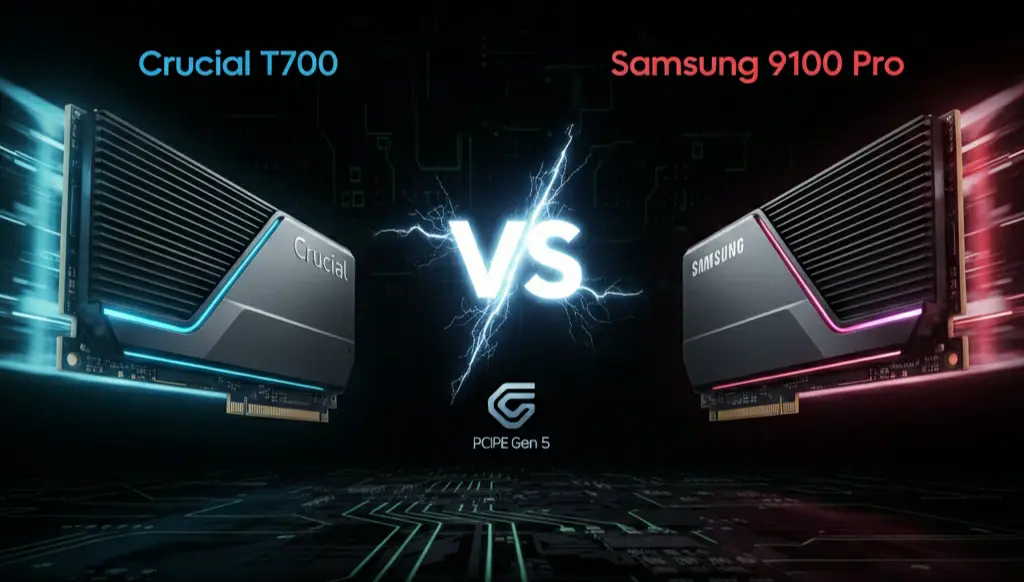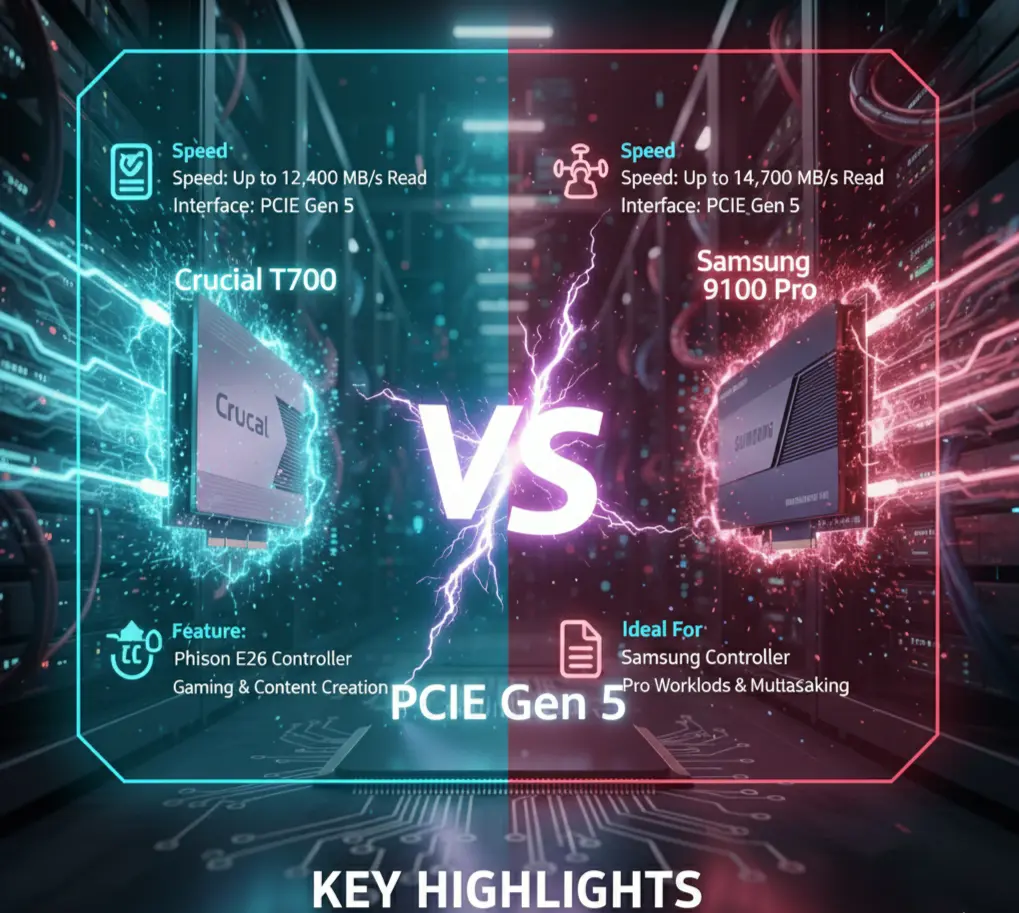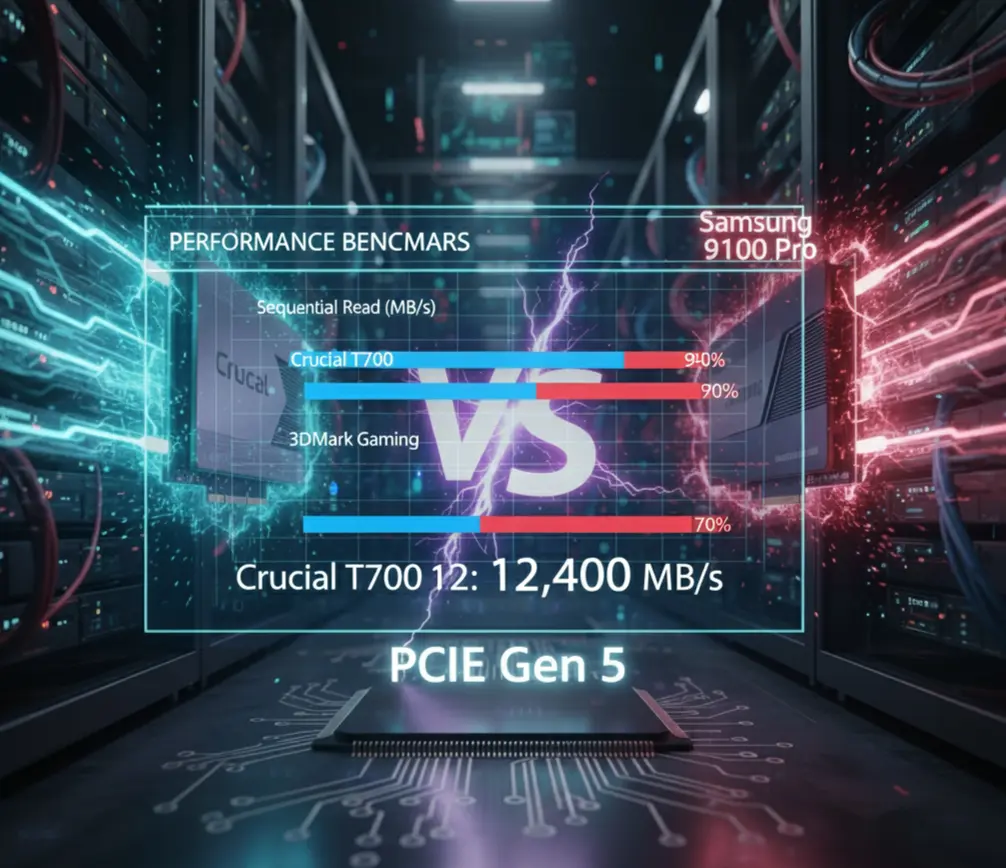The race for the fastest consumer SSD has officially entered the PCIe 5.0 era, and leading the charge are two giants: the Crucial T700 vs Samsung 9100 Pro. Unlike the previous generation where a clear performance king existed, this is a true head-to-head battle.
The Crucial T700 was one of the first to market, wowing enthusiasts with its incredible sequential speeds. Now, the Samsung 9100 Pro has arrived, showcasing Samsung’s in-house controller and V-NAND technology to not only match but in some aspects, surpass the competition. This blog post will dive deep into the technical specifications and real-world performance of both drives to declare a winner in the high-performance storage market.
Feature-by-Feature Comparison Table

Here is a detailed breakdown of the key specs for both flagship SSDs.
| Feature | Crucial T700 (4TB) | Samsung 9100 Pro (4TB) |
| Interface | PCIe 5.0 x4 | PCIe 5.0 x4 |
| Controller | Phison E26 | Samsung “Presto” (S4LY027) |
| NAND Flash | Micron 232-Layer TLC | Samsung 236-Layer TLC (V8) |
| Sequential Read | Up to 12,400 MB/s | Up to 14,800 MB/s |
| Sequential Write | Up to 11,800 MB/s | Up to 13,400 MB/s |
| Random Read (4K) | Up to 1,500,000 IOPS | Up to 2,200,000 IOPS |
| Random Write (4K) | Up to 1,700,000 IOPS | Up to 2,600,000 IOPS |
| Endurance (TBW) | 2400 TBW | 2400 TBW |
| Form Factor | M.2 2280 | M.2 2280 |
| Heatsink | Optional/Included | Optional/Included |
| Warranty | 5-Year Limited | 5-Year Limited |
Quick Highlights Table
| Crucial T700 | Samsung 9100 Pro |
| ✅ Blazing Sequential Speed: One of the first to deliver Gen5 performance. | ✅ Superior Overall Performance: Wins in sequential and random tests. |
| ✅ Wide Compatibility: Works well with various PCIe 5.0 motherboards. | ✅ Optimized Controller: Samsung’s in-house “Presto” controller is highly efficient. |
| ✅ Solid Endurance: A very durable and reliable drive. | ✅ Excellent Thermal Efficiency: Runs cooler than some competitors despite its speed. |
| ❌ Lower Random Performance: Not as strong in daily-use scenarios compared to its rival. | ❌ New to Market: Still building its long-term reliability reputation. |
| ❌ High Heat Output: Can require a beefy heatsink for sustained performance. | ❌ Premium Price: Typically commands a slightly higher price tag. |
Key Takeaways Crucial T700 and Samsung 9100 Pro

While both drives are at the pinnacle of consumer storage, the benchmarks reveal some important distinctions:
- Raw Performance: The Samsung 9100 Pro has a clear advantage on paper, with higher sequential and significantly better random read/write speeds. This translates to faster boot times, smoother multitasking, and quicker application launches, not just faster large file transfers.
- Thermal Management: The Samsung 9100 Pro, despite its blistering speeds, is engineered with a more power-efficient 5nm controller. This allows it to run cooler and potentially sustain peak performance for longer without thermal throttling, a key concern with high-end PCIe 5.0 drives.
- System Suitability: Both drives are only suitable for systems with a PCIe 5.0 M.2 slot. However, the Samsung 9100 Pro’s single-sided design on smaller capacities makes it a more versatile fit for tight spaces, including the PlayStation 5. The Crucial T700 can be double-sided on higher capacities.
Pros & Cons of Crucial T700 vs Samsung 9100 Pro
Crucial T700
- Pros:
- Phenomenal Sequential Performance: Hits some of the highest sequential speeds ever recorded on a consumer drive.
- Solid Endurance: The 2400 TBW endurance rating for the 4TB model is excellent.
- Proven Technology: Crucial/Micron’s Phison E26 platform is well-tested and reliable.
- Cons:
- Not the Fastest: Has been slightly outpaced by the Samsung 9100 Pro’s superior speeds.
- Higher Thermals: Can run quite hot under heavy loads, requiring a robust cooling solution.
Samsung 9100 Pro
- Pros:
- Highest Sequential Speeds: Currently the fastest consumer SSD available for sequential transfers.
- Unmatched Random Performance: Provides a noticeable boost in everyday system responsiveness and gaming.
- Superior Efficiency: The 5nm controller offers better performance-per-watt and thermal management.
- Broad Compatibility: Single-sided design on most models offers wider system compatibility.
- Cons:
- Premium Price: Often the most expensive option on the market.
- Newer Platform: While Samsung is a trusted brand, the “Presto” controller is a new component in the consumer market.
Buying Recommendations

- Go with the Crucial T700 if: You are an enthusiast looking for a high-performance SSD from a trusted brand with a proven track record. You prioritize raw sequential speed for large file workloads and have a motherboard with an excellent heatsink. You want to get into the Gen5 space at a slightly more competitive price point.
- Go with the Samsung 9100 Pro if: You want the absolute best of the best, with no compromises on performance. You are a content creator, professional, or power user who values not just sequential speeds but also superior random performance for a smoother, faster overall system experience. You’re building a top-tier PC and are willing to pay a premium for a flagship drive.
Final Verdict
The Samsung 9100 Pro takes the crown in this head-to-head competition. While the Crucial T700 is an incredibly fast and capable drive, the Samsung 9100 Pro’s superior random performance and more efficient thermal management make it the better all-around package. It not only leads the charts in sequential speed but also delivers a tangible improvement in day-to-day use. If budget is no object and you want the pinnacle of consumer SSD technology, the Samsung 9100 Pro is the clear winner.
FAQ for Crucial T700 and Samsung 9100 Pro
Q1: What is the main difference between the Crucial T700 and the Samsung 9100 Pro?
A: Both are high-end PCIe 5.0 SSDs, but the Samsung 9100 Pro is generally faster in all key metrics, including sequential and random performance, and runs more efficiently.
Q2: Do I need a heatsink for these SSDs?
A: Yes, a robust heatsink is mandatory for both. PCIe 5.0 SSDs generate significant heat under load, and a heatsink is essential to prevent thermal throttling and maintain peak performance.
Q3: Are these SSDs compatible with the PlayStation 5?
A: Yes, both the Crucial T700 and the Samsung 9100 Pro are compatible with the PlayStation 5, provided you use a model with a suitable heatsink.
Q4: Is a PCIe 5.0 SSD worth the upgrade over a PCIe 4.0 SSD?
A: For most everyday users, a high-end PCIe 4.0 SSD is still plenty fast. The upgrade to a PCIe 5.0 drive is primarily for professional users, content creators, and enthusiasts who can truly benefit from the massive sequential bandwidth for large files.
Q5: What are the different capacities available for these drives?
A: Both drives are typically available in 1TB, 2TB, and 4TB capacities. Samsung has also announced an 8TB version of the 9100 Pro.
Q6: What does “TBW” mean, and why is it important?
A: TBW stands for “Terabytes Written.” It’s an endurance rating that indicates the total amount of data that can be written to the drive over its lifetime. A higher TBW rating means the drive is more durable and can withstand more data writes before its cells wear out. Both drives have excellent TBW ratings, backed by a 5-year warranty.
Conclusion
The Crucial T700 and Samsung 9100 Pro represent the cutting edge of consumer storage. While the T700 is a fantastic drive that cemented Crucial’s place in the Gen5 market, the Samsung 9100 Pro has arrived to set a new standard. For those seeking the absolute best performance for demanding tasks and are not constrained by budget, the Samsung 9100 Pro is the clear choice. For everyone else, its very existence pushes the market forward, but a high-end PCIe 4.0 drive may still offer a better value proposition.
If you have any questions about “Crucial T700 vs Samsung 9100 Pro: The True Gen5 SSD Battle,” then feel free and let us know through your comments.



